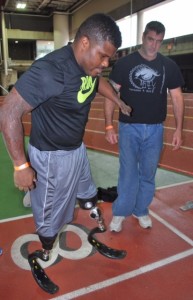Mujahid Karim, otherwise known as Muji, has had a passion for sports for as long as he can remember. He even took this passion further than most when he decided to go to the University of New Hampshire to play division 1 football as a Wildcat. He has identified with sports his entire life; they were a part of the person he was.
 In 2011, Muji was in a bad car accident that made him now also identify as a bi-lateral leg and partial-hand amputee.
In 2011, Muji was in a bad car accident that made him now also identify as a bi-lateral leg and partial-hand amputee.
“When the doctors told me that, because of the severity of the burns to my residual limbs, it would be at least a year and a half before I could use prosthetics or even think about walking again,” says Muji. “And let’s just say I became a little anti-authority.”
Having to recover from something – both physically and mentally – takes a toll on even the strongest people. But because Muji had been an athlete for so long, he thought his journey would be different. He admits it became overwhelming at times, and that he just tried to think of things day-to-day and week-to-week.
Muji decided to stop focusing on what he couldn’t do anymore, and instead just did what he could. He was determined to make his recovery different, to put all those years of hard work to use. Five months later, Muji was walking. An entire year earlier than expected.
As time went on, weeks became months, and months became years, Muji was determined to reclaim his identity as an athlete – able-bodied or not. He started walking faster and lifting weights, and even moving to the treadmill – things he didn’t think he could do.
Muji’s journey was different. And not just because he was in good physical shape, but because the mindset behind his accomplishments is unbelievably steadfast. After years of hard work and recuperating, Muji put on his first pair of running blades and hasn’t stopped running since.
“At first I definitely needed some assistance,” Muji admits. “But by the end of the clinic I was at, I was jogging up and down the field on my own and I thought, ‘wow, I could actually be really good at this.’”
From that moment on, he was addicted to the speed and the idea of moving fast after being confined to slow movements for two years. It was at this running clinic that Muji met Joe Walsh, president of Adaptive Sports New England, and told him his story. Immediately, he wanted to help Muji; he wanted to be a resource for him. Joe gave Muji access to trainings and clinics that taught him an entirely new way to run.
“I was a completely different animal now,” said Muji. “I was using two different running styles with every step I took.”
Muji considers himself a competitor at heart, but says running was just about the opportunity to compete, not the competition itself. Winning has never been his sole focus, and Muji truly enjoys the entire process of training and reaching new milestones on a personal level.
Because of all of his hard work, Muji is now a contender for the U.S. Paralympic team for the upcoming games in Rio. For Muji to get to this point, he has challenged himself on a daily basis. Once he wrapped his mind around this actually being a possibility, he only worked harder and harder until he was able to complete his first full post-injury run at the Fall 2014 Paralympic Experience.
He has been training, researching and most importantly, running his way to the qualifiers this year. Competition after competition, Muji strives to do better and get to a point where he can compete at the Paralympics. The fact that this is now a possibility still blows his mind, and when he looks back on people trying to tell him how things were going to go, what to do and when to do it, he wants other adaptive athletes to figure out what’s best for them.
“These past ten months, I’ve been training on my own, figuring out what works for me and what doesn’t,” says Muji. “I think this is where adaptive athletes are similar – they have some sort of ailment that holds them back, but we all have the mindset that it won’t hold us back.”
When asked what sticks out the most from his journey, Muji says, “Everyone’s goal is going to be different, but what I’ve realized through all of this is that my quality of life just keeps getting better the harder I work. I have a 20 month old son, and being able to just pick him up, play with him, take him to the park – it’s all a bi-product of the work I’ve put in to become a Paralympic athlete.
At the beginning, Muji had all these thoughts of ‘would I be able to do these things?’ And he proves that he can every day.
If you live in the Greater Boston area and you have a physical disability or a visual impairment, we’d love to meet you at the upcoming Paralympic Experience, happening on April 24, 2016 at Boston College High School in Dorchester. The Paralympic Experience is a one-day, multi-sport, introductory clinic for youth and adults to try Paralympic sports and to meet staff from adaptive sport programs from Boston and across New England. For more information and to register, please visit our Eventbrite page. We hope to see you there!
